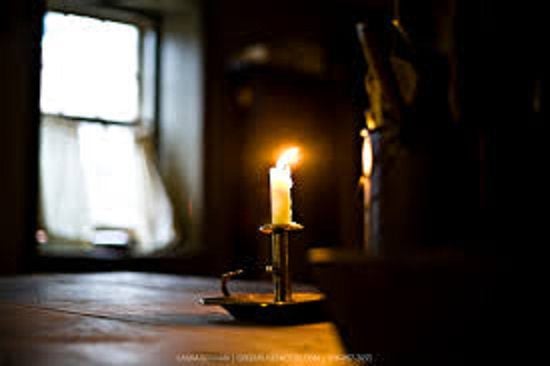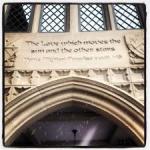I asked my Facebook friends a while ago to list three or four books that changed their lives. Not necessarily books that belong in the Great Books curriculum, but books that came just at the right time and spoke to them in a particular and memorable way. I wrote about one of mine a couple of weeks ago–here’s another one.
A candle flame looks beautiful in the light of morning . . . It seems to me to be a metaphor for the human soul, the singular light within the great general light of existence. Marilynne Robinson, Gilead
Marilynne Robinson has been one of my favorite authors for years, but I’ve only included her on a course syllabus once, when she joined Simone Weil and Iris Murdoch for my “Contemporary Women in Philosophy” course a coupleof years ago. Robinson’s essays and fiction are brilliant; she also happens to be the author of the book that is closest to perfect of any I have read.

The front and back covers, as well as the opening pages, of best-selling and award-winning books are often filled with excerpted and edited reviews from various publications, reviews so similar from book to book and so over the top that I often wonder if there is a central-clearing house where authors and editors can order canned reviews to their liking. But sometimes the reviewers capture a book’s essence perfectly—such is the case with Marilynne Robinson’s Pulitzer Prize winning Gilead. Described as “so serenely beautiful and written in a prose so gravely measured and thoughtful, that one feels touched with grace just to read it,” and as
A book that deserves to be read slowly, thoughtfully, and repeatedly . . . I would like to see copies of it dropped onto pews across our country, where it could sit among the Bibles and hymnals and collection envelopes. It would be a good reminder of what it means to lead a noble and moral life—and, for that matter, what it means to write a truly great novel,
Amen.
In Gilead, a rural Congregational minister in his late seventies is writing a memoir for his young son, an only child unexpectedly born to Reverend Ames and his much-younger wife when Ames is seventy. Ames expects to die long before the child is grown, and Gilead is his love letter to his son containing as much guidance and wisdom as Ames can muster. The prose is measured and profound. Ames writes that for him “writing has always felt like praying, even when I wasn’t writing prayers, as I was often enough. You feel that you are with someone.” On my best writing days I have this in mind as a standard.
I have often thought that if my maternal grandfather, a potato farmer with an eighth-grade education who was the wisest and best man I ever met, had been a character in a novel, he would have been Reverend Ames. One of Ames’ greatest continuing insights concerns the sacredness of all things. As he nears the end of his life, he pays close attention to the mystery and miracle of things most of us dismiss as “ordinary.”
It has seemed to me sometimes as though the Lord breathes on this poor gray ember of Creation and it turns to radiance—for a moment or a year or the span of a life. And then it sinks back into itself again, and to look at it no one would know it had anything to do with fire, or light. . . . Wherever you turn your eyes the world can shine like transfiguration. You don’t have to bring a thing to it except a little willingness to see. Only, who has the courage to see it?
For Reverend Ames, everything is a sacrament with intimations of holiness. And for this Calvinist preacher, the Divine Being he has served and conversed with for decades is still a mystery.
I don’t remember how Gilead came to me, or even when I read it for the first time (at least a half-dozen reads ago), but the Reverend’s struggles with the austere doctrines of his Calvinist faith are familiar. His is the religious world of my youth, a world that I have struggled mightily at different times to understand, to incorporate, or to leave. One passage in particular shook me to my core:
Calvin says somewhere that each of us is an actor on a stage and God is the audience. That metaphor has always interested me, because it makes us artists of our behavior, and the reaction of God to us might be thought of as aesthetic rather than morally judgmental in the ordinary sense. How well do we understand our role? With how much assurance do we perform it? . . . We all bring such light to bear on these great matters as we can. I do like Calvin’s image, though, because it suggests how God might actually enjoy us. I believe we think about that far too little.
The simple image of God as the audience for the artistic performance of the human drama and comedy, rather than the authoritative judge who is taking note of every single one of our failures, was transformative for me. I recall a similar moment early during my 2009 sabbatical when, during a noonday reading of daily psalms with a couple dozen Benedictine monks, we read in Psalm 149 that “the LORD takes delight in his people.” Who knew? Reverend Ames is right—we do think about this far too little.
Reverend Ames also provided me with a new angle on rational proofs for the existence of God, something I have grappled with both as a philosophy professor and as a human being for as long as I can remember. His advice is that belief in God isn’t about proofs at all. As a matter of fact, making rational proofs the basis for either defending or challenging one’s faith will eventually erode whatever faith one has.
In the matter of belief, I have always found that defenses have the same irrelevance about them as the criticisms they are meant to answer. I think the attempt to defend belief can unsettle it, in fact, because there is always an inadequacy in argument about ultimate things. . . . Creating proofs from experience of any sort is like building a ladder to the moon. It seems that it should be possible, until you stop to consider the nature of the problem. So my advice is this—don’t look for proofs. Don’t bother with them at all. They are never sufficient to the question, and they’re always a little impertinent, I think, because they claim for God a place within our conceptual grasp.
If someone asked me to identify and summarize the attitudes underlying my ruminations about the interplay of philosophy and faith in this blog, I would point to this passage. Thanks, Rev.
In the final pages of Gilead, Reverend Ames bumps into Jack, the prodigal son of Ames’ best friend who is leaving town on the bus. Jack asks Ames to say goodbye to his father for him. Ames agrees to do so, but then says “The thing I would like, actually, is to bless you.” He uses his favorite text from the Jewish Scriptures, Aaron’s blessing from the Book of Numbers:
The Lord bless you and keep you. The Lord make His face to shine upon you and be gracious unto you. The Lord lift up His countenance upon you and give you peace.
Gilead has been that sort of blessing to me, more than any book I have ever read. I am most grateful.












